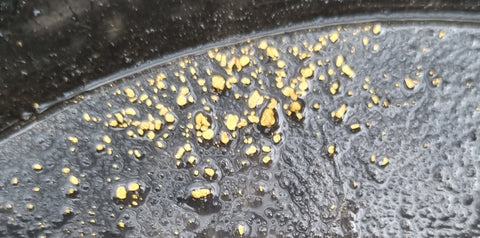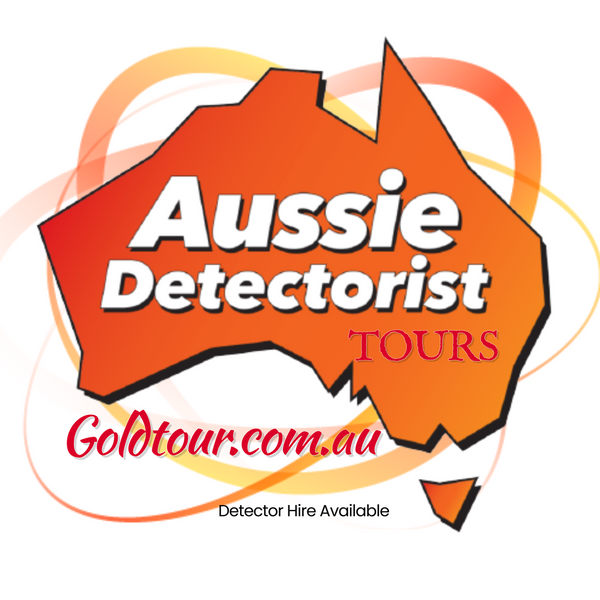
GOLD Prospecting and Fossicking Learn how to get started, get better and find GOLD in The Aussie Bush.
Share
Come and Join NAPFA and Aussie Detectorist for a weekend of prospecting and fossicking.
Are you ready to embark on an exciting journey in the heart of the Australian bush? Gold prospecting and fossicking offer a thrilling opportunity to connect with nature, uncover hidden treasures, and maybe even strike it rich!
Whether you're a seasoned prospector or a curious beginner, this blog post will guide you on how to get started, improve your skills, and increase your chances of finding that elusive gold nugget.
What is Gold Prospecting and Fossicking?
Gold prospecting and fossicking involve searching for gold in its natural form, typically in rivers, creeks, and other gold-bearing areas. It's a recreational activity that allows you to explore the great outdoors while hunting for valuable minerals. In Australia, gold prospecting has a rich history dating back to the gold rush era of the 1850s, and it continues to captivate adventurers to this day.
There are Hundreds of Old Gold Towns all around the country and many people use gold as the excuse to see many of these places.
You Might NOT Get rich looking for gold in the Australian Bush but you will 100% get HAPPY Trying.

Getting Started: Essential Equipment and Permits
Before you set off on your gold-seeking expedition, it's important to gather the necessary equipment.
You might need a metal detector, a gold pan, a sluice, a shovel, and a pick. These tools will help you detect and extract gold from the earth.
Taking An Aussie Gold Experience or Coming along to one of NAPFA's (NSW and ACT Prospectors and Fossickers Association) Education days is a great way to see which equipment you like to use and how to use it properly.
By trying as many different types of prospecting and fossicking you'll soon find the method and tools that you like to use best, BEFORE you go and buy them.
Education is the key to enjoying finding gold in Australia, with the right advice, tips and some basic Geology knowledge you can have the best chance of finding gold in the Bush.
Additionally, make sure to obtain the required permits and licenses, as gold prospecting is regulated in Australia to preserve the environment and ensure fair access to gold-bearing areas.
Mastering the Art of Gold Prospecting
Gold prospecting is both an art and a science. Here are some tips to help you improve your skills:
Research Potential Gold-Bearing Areas
Knowledge is power! Before heading out, research the geological history of the region you plan to explore. Look for areas with a history of gold deposits and learn about the geological indicators that can help you identify potential hotspots.
Learn to Read the Land
Observation is key. Pay attention to the landscape, rock formations, and the presence of quartz veins, ironstone, or other indicators of gold mineralization. Understanding the natural environment will greatly enhance your chances of finding gold.
Remember if you Join NAPFA or the PMAV in Victoria you can go to the sessions that teach you the basics of reading the ground and geology.
They also help with making sure you have access to the latest GEO, mapping and information to give you the best chance of finding gold.
Practice with Your Metal Detector
Mastering your metal detector is crucial. Spend time practicing in different terrains and familiarise yourself with the different signals it produces. This will help you distinguish between trash and valuable targets.
Attend a training course with a professional and learn the use of your chosen machine. a Days training has changed many peoples way of thinking and led them to their first Nugget.
Come and join in and lets gt you up and running faster.
Perfect Your Panning Technique
Gold panning is an essential skill for any prospector. Practice the proper technique of swirling the pan to separate the heavier gold from the surrounding sediment. With time and practice, you'll become a pro at spotting those glimmering specks of gold.
BILLIONS of dollars have been won from the gold pan, It all starts and ends in the dish.
Panning is a great way to see gold almost every trip away and there are even panning competitions you can attend.

Etiquette and Environmental Responsibility
As a responsible prospector, it's important to follow a few guidelines:
Respect Private Property and Protected Areas
Always seek permission before entering private property and avoid prospecting in protected areas, such as national parks or heritage sites.
Leave No Trace
Minimise your impact on the environment by practicing "Leave No Trace" principles. Pack out your trash, fill in any holes you dig, and avoid damaging vegetation or wildlife habitats.
Share Your Knowledge
Be a part of the gold prospecting community by sharing your experiences and knowledge with others. Join local clubs or online forums to connect with fellow prospectors and learn from their expertise.
So, are you ready to embark on your gold prospecting adventure? Remember, it's not just about finding gold—it's about immersing yourself in the beauty of the Australian bush, connecting with nature, and embracing the thrill of the hunt. Happy prospecting!
Look forward to seeing you out there
Clegy
Aussie Detectorist Tours and training
